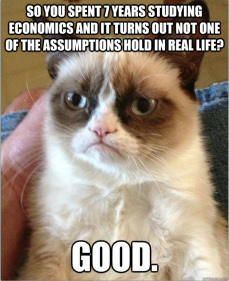From Lars Syll There is something about the way economists construct their models nowadays that obviously doesn’t sit right. The one-sided, almost religious, insistence on axiomatic-deductivist modelling as the only scientific activity worthy of pursuing in economics still has not given way to methodological pluralism based on ontological considerations (rather than formalistic tractability). In their search for model-based rigour and certainty, ‘modern’ economics has turned out to be a totally hopeless project in terms of real-world relevance. If macroeconomic models — no matter of what ilk — build on microfoundational assumptions of representative actors, rational expectations, market clearing and equilibrium, and we know that real people and markets cannot be expected to obey these
Topics:
Lars Pålsson Syll considers the following as important: Uncategorized
This could be interesting, too:
tom writes The Ukraine war and Europe’s deepening march of folly
Stavros Mavroudeas writes CfP of Marxist Macroeconomic Modelling workgroup – 18th WAPE Forum, Istanbul August 6-8, 2025
Lars Pålsson Syll writes The pretence-of-knowledge syndrome
Dean Baker writes Crypto and Donald Trump’s strategic baseball card reserve
from Lars Syll
There is something about the way economists construct their models nowadays that obviously doesn’t sit right.
The one-sided, almost religious, insistence on axiomatic-deductivist modelling as the only scientific activity worthy of pursuing in economics still has not given way to methodological pluralism based on ontological considerations (rather than formalistic tractability). In their search for model-based rigour and certainty, ‘modern’ economics has turned out to be a totally hopeless project in terms of real-world relevance.
 If macroeconomic models — no matter of what ilk — build on microfoundational assumptions of representative actors, rational expectations, market clearing and equilibrium, and we know that real people and markets cannot be expected to obey these assumptions, the warrants for supposing that model-based conclusions or hypotheses of causally relevant mechanisms or regularities can be bridged to real-world target systems, are obviously non-justifiable. Incompatibility between actual behaviour and the behaviour in macroeconomic models building on representative actors and rational expectations microfoundations shows the futility of trying to represent real-world target systems with models flagrantly at odds with reality. As Robert Gordon once had it:
If macroeconomic models — no matter of what ilk — build on microfoundational assumptions of representative actors, rational expectations, market clearing and equilibrium, and we know that real people and markets cannot be expected to obey these assumptions, the warrants for supposing that model-based conclusions or hypotheses of causally relevant mechanisms or regularities can be bridged to real-world target systems, are obviously non-justifiable. Incompatibility between actual behaviour and the behaviour in macroeconomic models building on representative actors and rational expectations microfoundations shows the futility of trying to represent real-world target systems with models flagrantly at odds with reality. As Robert Gordon once had it:
Rigor competes with relevance in macroeconomic and monetary theory, and in some lines of development macro and monetary theorists, like many of their colleagues in micro theory, seem to consider relevance to be more or less irrelevant.
